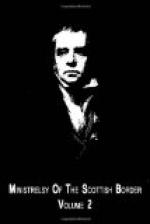And all our wants are well supplied,
From every rich man’s
store;
Who thankless sins the gifts he gets,
&c.—P. 187. v. 3.
To sin our gifts, or mercies, means, ungratefully to hold them in slight esteem. The idea, that the possessions of the wicked are most obnoxious to the depredations of evil spirits, may be illustrated by the following tale of a Buttery Spirit, extracted from Thomas Heywood:—
An ancient and virtuous monk came to visit his nephew, an inn-keeper, and, after other discourse, enquired into his circumstances. Mine host confessed, that, although he practised all the unconscionable tricks of his trade, he was still miserably poor. The monk shook his head, and asked to see his buttery, or larder. As they looked into it, he rendered visible to the astonished host an immense goblin, whose paunch, and whole appearance, bespoke his being gorged with food, and who, nevertheless, was gormandizing at the innkeeper’s expence, emptying whole shelves of food, and washing it down with entire hogsheads of liquor. “To the depredation of this visitor will thy viands be exposed,” quoth the uncle, “until thou shalt abandon fraud, and false reckonings.” The monk returned in a year. The host having turned over a new leaf, and given christian measure to his customers, was now a thriving man. When they again inspected the larder, they saw the same spirit, but woefully reduced in size, and in vain attempting to reach at the full plates and bottles, which stood around him; starving, in short, like Tantalus, in the midst of plenty. Honest Heywood sums up the tale thus:
In this discourse, far be it we should mean
Spirits by meat are fatted made, or lean;
Yet certain ’tis, by God’s permission, they
May, over goods extorted, bear like sway.
* * * * *
All such as study fraud, and practise
evil,
Do only starve themselves to plumpe the devill.
Hierarchie of the Blessed Angels, p.
577.
ERLINTON. NEVER BEFORE PUBLISHED.
This ballad is published from the collation of two copies, obtained from recitation. It seems to be the rude original, or perhaps a corrupted and imperfect copy, of The Child of Elle, a beautiful legendary tale, published in the Reliques of Ancient Poetry. It is singular, that this charming ballad should have been translated, or imitated, by the celebrated Buerger, without acknowledgment of the English original. As The Child of Elle avowedly received corrections, we may ascribe its greatest beauties to the poetical taste of the ingenious editor. They are in the truest stile of Gothic embellishment. We may compare, for example, the following beautiful verse, with the same idea in an old romance:
The baron stroked his dark-brown cheek,
And turned his face aside,
To wipe away the starting tear,
He proudly strove to hide!
Child of Elle.




